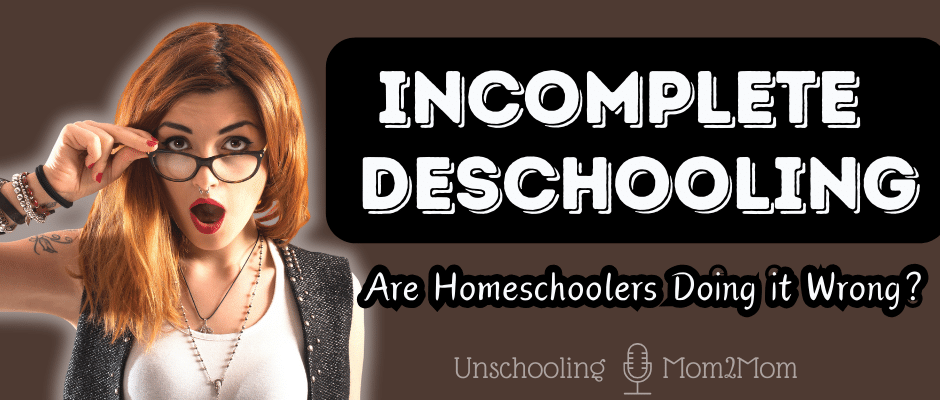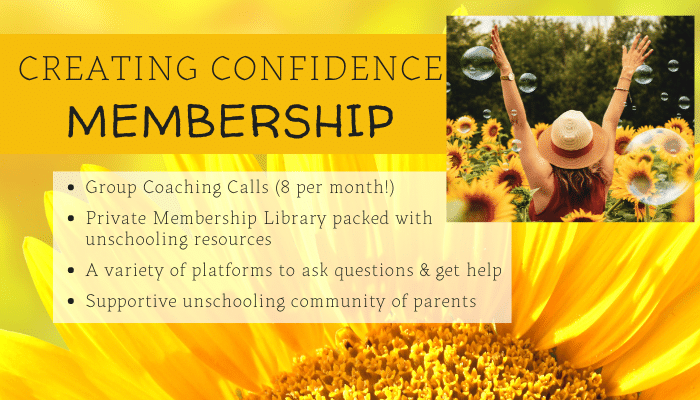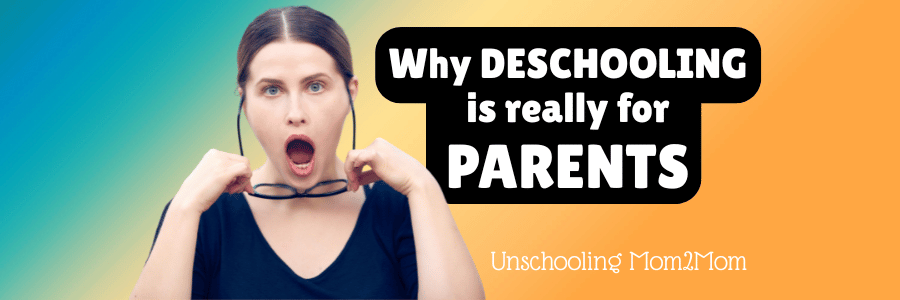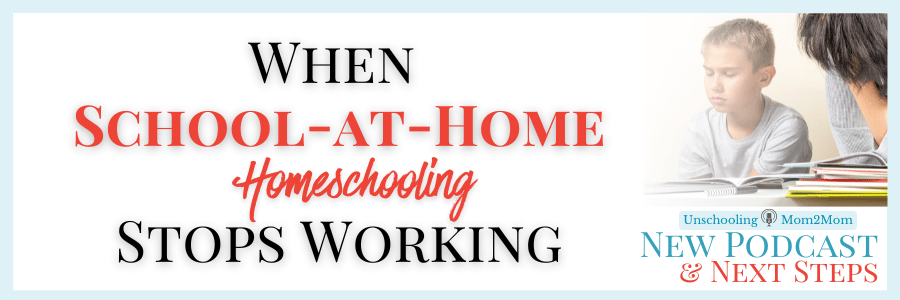Incomplete Deschooling
Are Traditional Homeschoolers doing this wrong?
Could that be the source of all the frustration with how you homeschooling time has been going?
Let's talk about it!
Listen to the Podcast or Watch the Video!
The question comes up about how do you know when you’re done Deschooling and you’re moving more into unschooling?
In the past I’ve always said the deschooling is that period of time that you need to start to dismantle some of the preset ideas that you have because of...
- the way you were taught,
- the way you learned what you were told,
- how school conditioned you,
- how society conditioned you.
You start to examine that concept that some subjects are more important than other subjects or the subjects have to be learned in a certain linear fashion, or with arbitrary timelines that schools have created… you learn you don’t really have to do that.
You begin to value the learner more than the lesson plan.
You start to recognize that the motivation of the learner is key and that a lot of school focuses on the way the system runs and the teachers’ role in keeping that chugging along.
So the fuzzy part comes in when someone says,
How do you know you’re done with deschooling?
When does Unschooling start?

I’ve always considered it a gradual evolution:
You begin living life as if school doesn’t exist.
You stop putting those expectations on your family, on your life, on your schedule, etc.
Also, in the past, as an unschooler, I’ve felt that the traditional homeschoolers, who did their two weeks of deschooling, or month, or months plural, were doing it wrong.
This came up in my
Membership group this past weekend. Someone new to unschooling - but not really new to homeschooling - wanted to know if there’s a difference between how unschoolers deschool and how traditional homeschoolers deschool.
I think my perspective was that the homeschoolers - those who do school-at-home - were simply using
Deschooling as a RESET button, a pause, a little respite from one schooling approach to another.
I felt like this approach indicated that
they really hadn’t deschooled all the way.
Because if they had truly deschooled, they wouldn’t go back to subjects and top-down teacher-driven approaches and curriculum, scope and sequences, age expectations, all those things that we learned from our own school experiences.
I always felt that the more traditional homeschoolers just didn’t deschool all the way.
To be honest, that didn’t seem far-fetched to me because all of this is a scary process. So many unknowns! It’s like wandering through darkness, getting nervous, and turning back. So those who do their bit of deschooling, then plug back into the school approach - even if they modify it to a degree - just didn’t continue on through the darkness so they could come out on the other side.

Let's Ponder Deschooling Together...
I’ve spent the last 30 years - really, my whole life - trying to see things from other peoples’ perspectives.
I haven’t felt the need to defend my thoughts or my perspectives to convince everyone that I’m right and they’re wrong. To be honest, I’ve always felt my opinions are a work in progress. Maybe that’s an age thing - I am 62 😳 - and I can look back over my entire life and see twists and turns, places where I was soo sure, and then something revealed itself to be... not the case. 🤣 🤦🏻♀️
But now I have these grown children who grew up without a scope and sequence without a top-down, teacher approach, who have a lot of confidence in some areas, and not so much in others.
But they know how to find the resources they need to do what they want to do.
So my Saturday morning pondering... was all about deschooling.
- Which camp is right?
- What IS making all those homeschooling families who step off the conveyor belt when they’re deschooling, step back on?
- Is it just about adjusting the speed?
- And that’s what they’re considering individualizing for their situation?
I think that’s the case.
Because my grown kids who did not step back on the conveyor belt, at any speed, are not at any disadvantage for having done that.
Any disadvantages they have are because I maybe didn’t engage as well as I should have.
Live and learn, right?
But no disadvantage is irreparable. Learning doesn’t end.
Anyone can learn anything whenever they see the need. At any age.
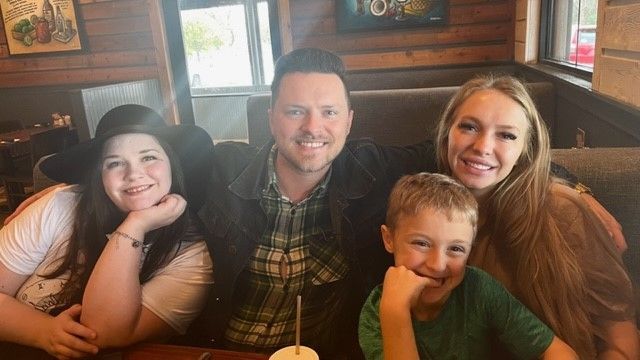
How do you know you're DONE Deschooling?
But I want to stick with deschooling here today.
How do you know when you’re done?
You don’t.
You don’t know when it’s done and you don’t ever really stop.
It’s like shading colors in art. There’s a blending. You start with one color, add in another, And then as you move through it, you’ve created another color.
So with deschooling, you set all that schooly stuff aside...and you move into unschooling when you stop thinking in schoolish terms.
You stop the age-related comparisons.
You stop trying to add in more academics to offset all this fluff - air quotes in there somewhere - because it all matters.
The learner decides the emphasis, not the parent.
The parent continues to expose and bring ideas to the table - but there’s more listening than lecturing, more observing than teaching.
And that doesn’t happen all at once for most of us.
We get nervous.
We do a little comparison - comparisons have been so important in our lives up to this point- of course we do that.
We get a little too hungry , angry, lonely, or tired, and we fall back to the familiar, right?
And while that’s probably inevitable, it’s not helpful.
We give kids mixed messages. We embrace the individuality, the learner-driven approach, and then we pull out the workbooks because something made us nervous. The kids reveal they don’t know something we think “all kids their age should know.”
So they’re left with the thought that you either aren’t that confident, or the school way really IS the right way, but your family just lacks the discipline to pull it off.
And I just want to add, I did this too. This waffling.
Maybe we all do as we deschool and have to figure this out.
But pulling out that curriculum because you’re not sure what else to do, is counterproductive.
Familiar, but not helpful.
Better to lean toward the learner and their interests, and see what you, with more life experiences, can offer to make it more fun, a richer life experience for the kids - for all of you really. To demonstrate how digging around to find the resources needed is the REAL lesson - not the topic for rote memorization. Those can be answered by Siri or googling. But knowing HOW to do that… how to deal with FINDING the solution that you need. That’s the education everyone needs.
So... in this stage of my observations in all of this, I still believe that the traditional homeschooling approach, almost unschooling, or unschooling everything except a couple of subjects, is
Incomplete Deschooling.
Not that I have any judgements about it, parents have to find their way and do their own pondering.
They have to tackle their own fears and motivations, dismantling their own stuff so they don’t push it off on their kids as a way to manage their own anxiety about it all. It’s a process, right?
And we all have different bandwidths, even different seasons in our lives where we can take on the hard stuff - or not.
Return to it later. Or not.
So I started this podcast as a musing of sort. Because that’s how I approach everything.
Where could I be wrong?
Where could I learn something from another perspective?
And I invite you to always do the same. This helps you grow your own confidence.
You don’t have to know definitively... you have to move in the direction of your own thoughts.
Notice when fear is driving the boat and then look closer to see what that’s about.
Also, know that that need for me to come to you with something definitive answer, is a leftover from school’s one right answer approach.
Comforting maybe, but not true.
Not true then, and not true in your real life now.
Anyone who tells you there’s only one right way... is wrong.
Unschooling has principles:
- Partnering with our kids to help them learn how to navigate all this freedom.
- Stepping away from the school’s ideas that learning has to look a certain way or go a certain pace.
How you do that will all be trial and error.
Individualizing is like that - it’s taking in all the data before you make the decisions.
Data like personalities and preferences, times of day, seasons of life - all the things that make you and your kids unique.
So if you’re brand new,
Welcome to the muddy side of learning.
The side that feels iffy a lot of the time.
It’s not because you’re doing it wrong. It’s because you’re finding your OWN way. You’re learning too.
And maybe you’ve been hanging out with people who haven’t deschooled completely.
You can choose differently from them. Because over here,
in the unschooling side of the homeschooling world, this is where you really individualize and you build these muscles of confidence.
Even when that means thinking, “
I’ve always thought of that a certain way, but let’s pull it out and look at it.”
At least you don’t have to do it alone. I’ll do it with you. I have an entire community where we can help you find your way. We can ponder together.
Let me know your thoughts.

